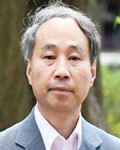| Biography | |
|---|---|
 Prof. Seiichi TAGUCHI Graduate School of Science, Technology and Innovation, Kobe University, Kobe, Japan |
|
| Title: Sustainable production, properties and biodegradation of lactate-based polymers biosynthesized from renewable carbon sources including CO2 | |
| Abstract:
The discovery of D-LA-polymerizing enzyme (LPE) allowed us to establish the microbial factory for production of lactate (LA)-based polymers with highly enantiomeric purity from renewable carbon sources including CO2. LPE has led us to further expand the range of diversity in monomeric constituents such as glycolic acid and (R)-2-hydroxybutyrate, leading to the generation of unnatural copolymers. To date, we have synthesized the highly chiral copolymers with various monomer compositions, owing to the intrinsic properties such as extremely high enantio-selectivity and broad substrate specificity of LPE. Recently, the beneficial mutations occurred in LPE can be feasibly interpreted based on the solved 3D-structures of polyhydroxyalkanoate (PHA) synthases. Especially, P[LA-co-3-hydroxybutyrate (HB)], termed LAHB, are introduced here. Here I will talk about the biosynthesis, properties and biodegradation of LA-based polymers.
The possibility of “secretion” of polymerized products has been desired so far in microbial system due to higher production and efficient down-stream treatment. This should be a challenging to overcome the cell volume limitation in the large amount of production of natural or chemical polymers (oligomers). Most recently, we have met to the secretion of low-molecular-weight D-LA-based polymers [oligomers (D-LAOs)]. As a second topic, I will talk about the first establishment of microbial secretion factory of D-LAOs through a PHA synthase-mediated chain transfer (CT) reaction. With CT agents bearing reactive groups, we have chemically synthesized poly(ester-urethane)s by using D-LAOs as macroinitiators. As a side story, we will talk about the finding of membrane vesicle generation upon intracellular polymer accumulation.
GRAPHICAL ABSTRACT

Figure Caption: Microbial production of bioplastics involved in circular bioeconomy system.
KEYWORDS
Bioplastics, Synthetic Biology, Biosynthesis, Evolutionary Engineering, Biodegradation, Polylactide.
ACKNOWLEDGEMENT
The acknowledgement is optional. You may acknowledge your funding supporter to complete your presenting work with the use Arial font 11.
REFERENCE
(1) Taguchi, S. et al. (2008), Proc. Natl. Acad. Sci. U.S.A., 105, 17323-17327.
(2) Matsumoto, K. and Taguchi, S. (2013), Curr. Opin. Biotechnol. (Review), 24(6), 1054-1060.
(3) Utsunomia, C., Matsumoto, K., and Taguchi, S. (2017), ACS Sustain. Chem. Eng., 5(3), 2360-2367.
(4) Matsumoto, K., Hori, C., Fujii, R., Takaya, M., Ooba, T., Isono, T., Satoh, T., Taguchi, S. (2018)
Biomacromolecules, 19(2), 662-671.
(5) Matsumoto, M., Iijima, M., Utsunomia, C., Ooi, T., Taguchi, S. (2018) Biomacromolecules, 19(7), 2889-2395.
(6) Miyahara, Y., Hiroe, A., Tsuge, T., Taguchi, S. (2019) Biotechnol. J., 14(12)
(7) Hori C. et al.(2020) Polym. Degrad. Stabilit., 179(9), 1-5.
(8) Taguchi, S. and K. Matsumoto, K. (2020) Polym. J. (Review), 53, 67-79.
(9) Hiroe, A., Sakurai, T., Miyahara, Y., Goto, S., Yamada, M., Tsuge, T., Taguchi, S. (2021) Int. J. Biol. Macromol., 167(15), 1290-1296
(10) Nduko, J. M. and Taguchi, S. (2021) Front. Bioeng. Biotechnol. (Review), Feb 4;8:61807767-7.
| |
| Biography:
After getting the Ph.D. (Degree of Engineering) from the University of Tokyo in 1989, he joined the Tokyo University of Science as an assistant professor and initiated the molecular evolutionary engineering of the valuable enzymes capable of catalyzing industrially important reactions. In 1997, he visited to join as research scientist at the Institute of Molecular and Cellular Biology of Immune System, Luis-Pasteur University in France. After spending the decade, he joined Prof. Doi’s Polymer Chemistry Laboratory of RIKEN as a senior research scientist and for the first time introduced modern approaches such as enzyme evolution to the biotechnological production of natural polyesters. He was promoted to Professor at the Graduate School of Engineering, Hokkaido University, in 2004, moved to Tokyo University of Agriculture in 2017 (Prof. Emeritus of Hokkaido University) and Kobe University in 2022. His current main research focuses on the Synthetic Biology for novel type of polymers based on the creation of novel biological catalysts, and biologically active molecules that can be adapted to the desired environment or biosystems.
Representative awards
2013: Top-ranked Research Award recommended by President of Hokkaido University
2016: Prizes for Science and Technology, The Commendation for Science and Technology by the Minister of Education, Culture, Sports, Science and Technology (MECST) ca.
| |
